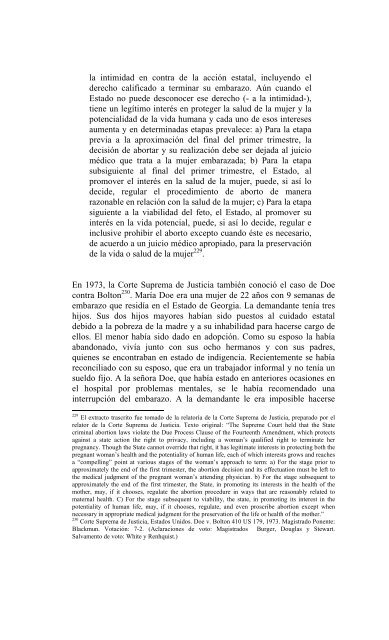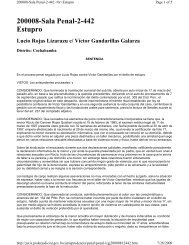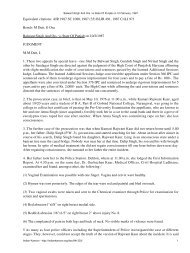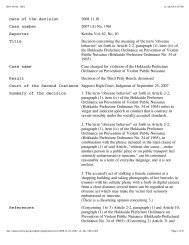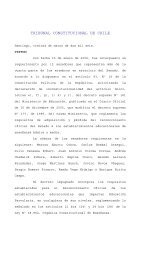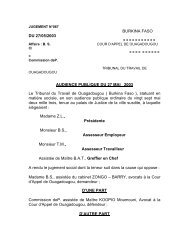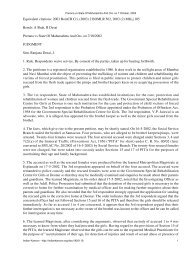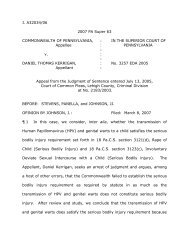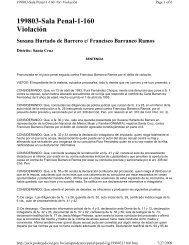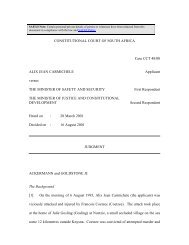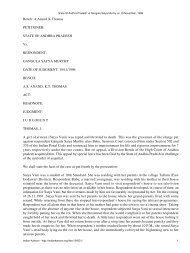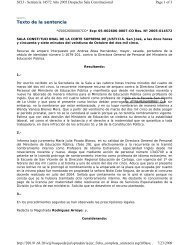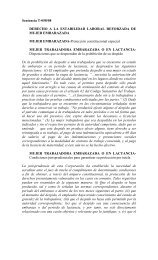- Page 1 and 2:
Sentencia C-355/06EXCEPCION DE PLEI
- Page 3 and 4:
ABORTO-Fundamento de la prohibició
- Page 5 and 6:
DERECHOS DE LA MUJER-Protección co
- Page 7 and 8:
DERECHO AL LIBRE DESARROLLO DE LAPE
- Page 9 and 10:
máxima intervención en la liberta
- Page 11 and 12:
derecho internacional. En todo caso
- Page 13 and 14:
los menores de edad/CONSENTIMIENTO
- Page 15 and 16:
123, 124 y 32 numeral 7 de la ley 5
- Page 17 and 18:
La demandante considera que las nor
- Page 19 and 20:
deseados. Al mismo tiempo el legisl
- Page 21 and 22:
existencia de un ser humano: la muj
- Page 23 and 24:
La mujer que en casos de violación
- Page 25 and 26:
suficiente preponderancia a los der
- Page 27 and 28:
Tercero: Que se declare la inexequi
- Page 29 and 30:
De argumentarse que dicha protecci
- Page 31 and 32:
El artículo 32 numeral 7 del Códi
- Page 33 and 34:
Violación del principio y el derec
- Page 35 and 36:
Corte a la despenalización del abo
- Page 37 and 38:
educación formal o especial, adecu
- Page 39 and 40:
deber de proteger la vida, conflict
- Page 41 and 42:
se funden en la construcción de ar
- Page 43 and 44:
Disminución Punitiva contenidas en
- Page 45 and 46:
vigencia de los derechos sexuales y
- Page 47 and 48:
la aplicación de una norma de car
- Page 49 and 50:
En este sentido. especialmente en l
- Page 51 and 52:
La penalización del aborto, se con
- Page 53 and 54:
Carta Política no sólo protege el
- Page 55 and 56:
los derechos humanos la protegen en
- Page 57 and 58:
en forma indeterminada, independien
- Page 59 and 60:
Vista brevemente la evolución de l
- Page 61 and 62:
discriminatorio a la mujer, y supon
- Page 63 and 64:
(i) si el acto que propicia un trat
- Page 65 and 66:
De esta manera, debe concluirse, qu
- Page 67 and 68:
Formas de Discriminación contra la
- Page 69 and 70:
procreativa (CP, art. 42), los dere
- Page 71 and 72:
El aborto inducido y el embarazo no
- Page 73 and 74:
sufren complicaciones que imponen u
- Page 75 and 76:
un grave problema de salud para las
- Page 77 and 78:
Esto sucede igualmente en el ámbit
- Page 79 and 80:
Cuando el embarazo es producto de u
- Page 81 and 82:
El primer derecho de un ser humano
- Page 83 and 84:
excepcionales la penalización del
- Page 85 and 86:
de la conducta, se configuran como
- Page 87 and 88:
de los derechos de toda persona dis
- Page 89 and 90:
que han venido siendo impugnadas an
- Page 91 and 92:
momento de presentación de esta in
- Page 93 and 94:
econozca, tampoco puede el Estado i
- Page 95 and 96:
de desechos humanos ya que no habr
- Page 97 and 98:
en contra de los argumentos de las
- Page 99 and 100:
•El día 17 de febrero de 2006, s
- Page 101 and 102:
3-. Solicitante: HENRY FERNET MOREN
- Page 103 and 104:
Constitucional C-133 de 1994 que ad
- Page 105 and 106:
D-5807 a la que, según indica, fue
- Page 107 and 108:
SÁNCHEZ PINEDA, MARTHA LUCÍA AMAD
- Page 109 and 110:
1-. Intervención donde se solicita
- Page 111 and 112:
MARULANDA, INÉS CORTÉS, GLORIA G
- Page 113 and 114:
14-. Intervención de MARIA ELISA U
- Page 115 and 116:
54-. NUBIA POSADA.55-. MARÍA CLAUD
- Page 117 and 118:
2-. Solicitante: SARAY MORALES DE F
- Page 119 and 120:
todos los estados vitales del ser h
- Page 121 and 122:
13-. Intervención amicus curiae de
- Page 123 and 124:
4.6.2.2. Intervenciones que solicit
- Page 125 and 126:
xii)J. BUDZISZEWSKI, profesor de go
- Page 127 and 128:
otros ciudadanos más presentaron e
- Page 129 and 130:
defender la dignidad del Ser Humano
- Page 131 and 132:
además que la maternidad es una in
- Page 133 and 134:
vi)A mediano y largo plazo, será c
- Page 135 and 136:
1-. LUIS RUEDA GÓMEZ interviene en
- Page 137 and 138:
esuelto en las sentencias C-133 de
- Page 139 and 140:
4.8.1.2. Intervenciones que solicit
- Page 141 and 142:
9-. INTERVENCION DE LA CORPORACION
- Page 143 and 144:
Anexa quinientas seis (506) interve
- Page 145 and 146:
9-. La ciudadana Gloria Stella Pena
- Page 147 and 148:
2-. El Decano de la Escuela de Dere
- Page 149 and 150:
13.- LEONARDO ARIEL BURGOS CUERVO,
- Page 151 and 152:
15.- KELLY JOHANA AGUDELO VELASQUEZ
- Page 153 and 154:
1-. En febrero 28 de 2006, la Seño
- Page 155 and 156:
19-. El día 06 de marzo de 2006, s
- Page 157 and 158:
41-. El día 06 de marzo de 2006, s
- Page 159 and 160:
63-. El día 06 de marzo de 2006, s
- Page 161 and 162:
85-. El día 06 de marzo de 2006, s
- Page 163 and 164:
Ley 599 de 2000 que asimila el abor
- Page 165 and 166:
y en la motivación de su fallo, pu
- Page 167 and 168:
4.2. En este orden, ha de tenerse e
- Page 169 and 170:
Es, precisamente, a partir de la cr
- Page 171 and 172:
sólo obligatoria sino prevalente l
- Page 173 and 174:
seriamente de esta cuestión. Así
- Page 175 and 176:
Degradantes (Convención contra la
- Page 177 and 178:
7.1.6 Convenio de Ginebra de 1949
- Page 179 and 180:
Haremos referencia a los instrument
- Page 181 and 182:
“Artículo 3.- toda mujer tiene d
- Page 183 and 184:
alguna ocasión aconsejo a la mujer
- Page 185 and 186:
9. Los criterios que determinan la
- Page 187 and 188:
9.3.3. El análisis que aquí se ha
- Page 189 and 190:
En cuanto a la proporcionalidad, de
- Page 191 and 192:
Cuando la vida de la mujer esta en
- Page 193 and 194:
9.4.4.1 Que el aborto se realice en
- Page 195 and 196:
comportamiento que resulta excesivo
- Page 197 and 198:
family planning. Volumen 24, No 4 d
- Page 199 and 200:
de la dignidad humana que se encuen
- Page 201 and 202:
10.4.2 Resulta injustificada la tip
- Page 203 and 204:
constitucionalidad de las normas ac
- Page 205 and 206:
Por su parte, el Art. 6º del Decre
- Page 207 and 208:
“En primer lugar, procede la inte
- Page 209 and 210:
“Cuarto.- INVITAR a participar en
- Page 211 and 212:
ciudadano las impugne o defienda. D
- Page 213 and 214:
derecho a la integridad personal (a
- Page 215 and 216:
irracional y desproporcionada a la
- Page 217 and 218:
3. Que el texto de referencia anter
- Page 219 and 220:
esuelto en un pronunciamiento anter
- Page 221 and 222:
Corte abordará el estudio de fondo
- Page 223 and 224:
vida. En efecto, esa norma dice que
- Page 225 and 226:
Por otra parte, si bien corresponde
- Page 227 and 228:
El legislador en tales hipótesis a
- Page 229 and 230:
excepcionales, especialmente cuando
- Page 231 and 232:
obstante el artículo 1º de dicha
- Page 233 and 234:
instrumentos del derecho internacio
- Page 235 and 236:
tal suerte que los tratados interna
- Page 237 and 238:
Ahora bien: aun cuando la igualdad
- Page 239 and 240:
Posteriormente, en la Conferencia M
- Page 241 and 242:
Es así como la CEDAW ha declarado,
- Page 243 and 244:
constitucionales y, en segundo luga
- Page 245 and 246:
supuestos, la decisión de retirarl
- Page 247 and 248:
se indicó antes, operan frente a t
- Page 249 and 250:
un principio constitucional y (iii)
- Page 251 and 252:
posibilidad real y efectiva de goza
- Page 253 and 254:
designio, ni impedir, a través de
- Page 255 and 256:
El derecho a ser madre, o, en otros
- Page 257 and 258:
En este sentido en la sentencia C-3
- Page 259 and 260:
También ha considerado la Corte, q
- Page 261 and 262:
intervención o procedimiento médi
- Page 263 and 264:
Ahora bien, este límite a la liber
- Page 265 and 266:
Económicos Sociales y Culturales,
- Page 267 and 268:
guardar simetría con el comportami
- Page 269 and 270:
desproporcionada los derechos de la
- Page 271 and 272:
entre los que se cuentan Chile, Cos
- Page 273 and 274:
desde el momento de la concepción,
- Page 275 and 276:
Se tiene, entonces, que cuando los
- Page 277 and 278:
Por una parte están diversos derec
- Page 279 and 280:
producto de una decisión libre y c
- Page 281 and 282:
Se trata también de aquellos event
- Page 283 and 284:
y la salud de la madre respecto de
- Page 285 and 286:
pertinente, a través de los mecani
- Page 287 and 288:
propio plan de vida y tener plena c
- Page 289 and 290:
en su artículo 12 que los Estados
- Page 291 and 292:
Por las anteriores razones es menes
- Page 293 and 294:
Para todos los efectos jurídicos,
- Page 295 and 296:
MagistradoCON SALVAMENTO DE VOTOHUM
- Page 297 and 298:
CONVENCION SOBRE LOS DERECHOS DEL N
- Page 299 and 300:
LIBERTAD DE CONCIENCIA-Alcance (Acl
- Page 301 and 302:
Demandas de inconstitucionalidadcon
- Page 303 and 304:
El artículo 48 de la Ley 270 de 19
- Page 305 and 306:
objeto de las prestaciones (atenci
- Page 307 and 308:
subjetivos y que solo es objeto de
- Page 309 and 310:
- Señor Presidente…- Doctor Zala
- Page 311 and 312:
corriente ésta se ve inspirada?, e
- Page 313 and 314:
ango normativo superior a las leyes
- Page 315 and 316:
Así pues, la definición citada se
- Page 317 and 318:
dementes en la administración de s
- Page 319 and 320:
4. Revocar el mandato de los elegid
- Page 321 and 322:
la preservación de la estabilidad
- Page 323 and 324:
ha manifestado : “Si cualquier li
- Page 325 and 326:
La liberta negativa , es negación
- Page 327 and 328:
“ Yo soy libre si puedo hacer lo
- Page 329 and 330:
muy amablemente de tomar sobre sí
- Page 331 and 332:
Así las cosas, en el evento en el
- Page 333 and 334:
“ … Así las cosas, la dignidad
- Page 335 and 336:
sus vidas. En otras palabras, lo qu
- Page 337 and 338:
Son unísonas las demandas al seña
- Page 339 and 340:
El concepto filosófico de libertad
- Page 341 and 342:
dejado de sus bienes y de su libert
- Page 343 and 344:
privacidad o intimidad que penetrar
- Page 345 and 346:
eproducirse y a quienes no quieren
- Page 347 and 348:
En un Estado de derecho, que presup
- Page 349 and 350:
El caso del peligro para la vida de
- Page 351 and 352:
circunstancias socioeconómicas, o
- Page 353 and 354:
congénita en la que se fusionan lo
- Page 355 and 356:
En consecuencia, igual situación s
- Page 357 and 358: Es necesario lograr un equilibrio e
- Page 359 and 360: d) Las restricciones innecesarias s
- Page 361 and 362: produce peligro para la vida o salu
- Page 363 and 364: ART. 123.—Aborto sin consentimien
- Page 365 and 366: Así las cosas, corresponde al Esta
- Page 367 and 368: sexual sin consentimiento, abusivo,
- Page 369 and 370: 3. El 2 de Mayo de 2006, la ciudada
- Page 371 and 372: En materia procesal civil existe la
- Page 373 and 374: Respecto de esta alegación , el su
- Page 375 and 376: Humana y a otras entidades que defi
- Page 377 and 378: La mejor prueba de la certeza en cu
- Page 379 and 380: La Sala Plena de esta Corporación
- Page 381 and 382: en la Carta las disposiciones que s
- Page 383 and 384: precepto acusado, mientras subsista
- Page 385 and 386: Sin embargo, esta Corte ha utilizad
- Page 387 and 388: Ahora bien, otro argumento que refu
- Page 389 and 390: de julio de mil novecientos noventa
- Page 391 and 392: ABORTO EN DERECHO COMPARADO-Alemani
- Page 393 and 394: determinación de otras siempre que
- Page 395 and 396: de la siguiente manera: el derecho
- Page 397 and 398: una carta generosa en derechos como
- Page 399 and 400: Lo anterior no significa que las hi
- Page 401 and 402: sobre el tema; ii) si las decisione
- Page 403 and 404: que los estados federados no podía
- Page 405 and 406: derecho a la intimidad articulado p
- Page 407: Esto significa que, de otra parte,
- Page 411 and 412: En 1992, en el caso de Planned Pare
- Page 413 and 414: permitidas, si no son un obstáculo
- Page 415 and 416: La Corte reiteró el precedente sen
- Page 417 and 418: y más seguro que el procedimiento
- Page 419 and 420: vida potencial hasta que el feto se
- Page 421 and 422: delito. Solamente se exceptuaban aq
- Page 423 and 424: La sección 218 del Código Penal r
- Page 425 and 426: posición de respeto. Si en estos c
- Page 427 and 428: La vida que se desarrolla en el vie
- Page 429 and 430: “Indicaciones para la interrupci
- Page 431 and 432: El Tribunal declaró la inconstituc
- Page 433 and 434: 4. Por principio, el aborto en cual
- Page 435 and 436: concedan efectos justificatorios cu
- Page 437 and 438: En resumen, las decisiones alemanas
- Page 439 and 440: excepción a la penalización, incl
- Page 441 and 442: la madre, quien también tiene el d
- Page 443 and 444: Estado, las regiones y las localida
- Page 445 and 446: parcialmente tocado con la derogaci
- Page 447 and 448: vigente, estableció una distinció
- Page 449 and 450: jurisdiccionales constitucionalment
- Page 451 and 452: constitucionalmente protegidos en f
- Page 453 and 454: durante el mandato de un Presidente
- Page 455 and 456: vulnerado sus derechos al libre des
- Page 457 and 458: del aborto terapéutico se deben da
- Page 459 and 460:
nacido, y se penalizaría a la muje
- Page 461 and 462:
La Corte Suprema de Justicia canadi
- Page 463 and 464:
La Corte Suprema de Justicia canadi
- Page 465 and 466:
Para la Corte, no era necesario res
- Page 467 and 468:
en el esquema legislativo, no serí
- Page 469 and 470:
y, además, puede incidir en su der
- Page 471 and 472:
Corte entiende que el derecho a la
- Page 473 and 474:
existen situaciones en las que se p
- Page 475 and 476:
vida en todas sus etapas de desarro
- Page 477 and 478:
afirmación según la cual la vida
- Page 479 and 480:
El 22 de noviembre de 2005 el Comit
- Page 481 and 482:
el Comité no considera necesario,
- Page 483 and 484:
embarazo y su terminación son, com
- Page 485 and 486:
era inseparable de la mujer. La Com
- Page 487 and 488:
Políticos, además de establecer u
- Page 489 and 490:
garantice la eficacia de las medida
- Page 491 and 492:
3.9.6. El Comité recomienda que la
- Page 493 and 494:
También preocupan al Comité las c
- Page 495 and 496:
50. El Código Penal vigente en Col
- Page 497 and 498:
mujer la existencia normas que pena
- Page 499 and 500:
no incluye explícitamente el abort
- Page 501 and 502:
Portugal establece una limitación
- Page 503 and 504:
En Italia el sistema de indicadores
- Page 505 and 506:
En Polonia la indicación de aborto
- Page 507 and 508:
iesgo a la vida de la mujer o cause
- Page 509 and 510:
Los abortos deben ser realizados en
- Page 511 and 512:
como la calificación del peligro,
- Page 513 and 514:
España también regula explícitam
- Page 515 and 516:
En Polonia también se contempla la
- Page 517 and 518:
atentado al pudor contra una mujer
- Page 519 and 520:
En Sudáfrica es posible la termina
- Page 521 and 522:
En Francia se contempla el aborto l
- Page 523 and 524:
Hungría comparte la limitación te
- Page 525 and 526:
socioeconómicos. Adicionalmente, p
- Page 527 and 528:
PaísAlemaniaOrientación básicade
- Page 529 and 530:
PaísOrientación básicade la Cort
- Page 531 and 532:
PaísOrientación básicade la Cort
- Page 533 and 534:
PaísOrientación básica de laCort
- Page 535 and 536:
PaísEstados UnidosOrientación bá
- Page 537 and 538:
PaísOrientación básica de laCort
- Page 539 and 540:
IrlandaPoloniaPaísOrientación bá
- Page 541 and 542:
PaísOrientación básica de laCort
- Page 543 and 544:
CUADRO III.SISTEMAS LEGISLATIVOS CO
- Page 545 and 546:
CUADRO IVSISTEMAS LEGISLATIVOS CON
- Page 547 and 548:
País Otro Vida de lamadreHungríaS
- Page 549 and 550:
CUADRO VSISTEMAS LEGISLATIVOS CON A
- Page 551 and 552:
PaísVida dela madreSalud mental de
- Page 553 and 554:
probatorio a la providencia. Por lo
- Page 555 and 556:
RESOLUCIONES Y RECOMENDACIONES DEOR
- Page 557 and 558:
conforman el bloque de constitucion
- Page 559 and 560:
En el aborto terapéutico la causa
- Page 561 and 562:
CONSENTIDA-Penalización no elimina
- Page 563 and 564:
equisitos jurisprudenciales que det
- Page 565 and 566:
cual "la pareja tiene derecho a dec
- Page 567 and 568:
votó 457 , que revelan que dicha A
- Page 569 and 570:
Sentencia tendría que haber demost
- Page 571 and 572:
“7) Dedúcese de lo dicho que, si
- Page 573 and 574:
existencia, entrará el recién nac
- Page 575 and 576:
“Esta protección, que indudablem
- Page 577 and 578:
En las siguientes líneas, los susc
- Page 579 and 580:
c. Por la fecundación (o concepci
- Page 581 and 582:
i. El material genético de los cro
- Page 583 and 584:
“Por espacio de 30 años, los ped
- Page 585 and 586:
entonces los estados comatosos, la
- Page 587 and 588:
a la protección jurídica del dere
- Page 589 and 590:
artículos de la Constitución Pol
- Page 591 and 592:
dementes y las personas afectadas p
- Page 593 and 594:
o más precisamente, que desde el c
- Page 595 and 596:
En el mismo sentido, en la Convenci
- Page 597 and 598:
como parámetro para llevar a cabo
- Page 599 and 600:
establecer si una resolución o rec
- Page 601 and 602:
derechos humanos, que de alguna man
- Page 603 and 604:
ella contiene la expresión de obse
- Page 605 and 606:
De lo anterior concluyen los suscri
- Page 607 and 608:
Finalmente, en la Conferencia de Be
- Page 609 and 610:
la concusión de que la penalizaci
- Page 611 and 612:
sus acciones. Así por ejemplo, aun
- Page 613 and 614:
tanto dejan de ser meros derechos s
- Page 615 and 616:
constitucionales, como el de presta
- Page 617 and 618:
Convención sobre los Derechos del
- Page 619 and 620:
causar intencionalmente la muerte d
- Page 621 and 622:
no hay intención de matar sino de
- Page 623 and 624:
Lo anterior revela que detrás de l
- Page 625 and 626:
pueden variar notablemente de un ho
- Page 627 and 628:
concepto lejos de significar que qu
- Page 629 and 630:
que deben existir regulaciones “d
- Page 631 and 632:
desconocimiento total, cosa que no
- Page 633 and 634:
manera de reparar los daños que pr
- Page 635 and 636:
Por lo anterior, no es posible ente
- Page 637 and 638:
considerado. Este sólo criterio, p
- Page 639 and 640:
En efecto, el legislador puede, mie
- Page 641 and 642:
las cosas, los magistrados disident
- Page 643 and 644:
especiales a las que se refirió la
- Page 645 and 646:
nueva costumbre o fuerza declarativ
- Page 647 and 648:
ABORTO-Antecedentes en Asamblea Nac
- Page 649 and 650:
Demandas de inconstitucionalidadcon
- Page 651 and 652:
carácter internacionalmente obliga
- Page 653 and 654:
“Según el Convenio de Ginebra I,
- Page 655 and 656:
en la opinión consultiva OC-9/87 d
- Page 657 and 658:
En cuanto a la fuerza vinculante de
- Page 659 and 660:
vinculantes en el análisis de cons
- Page 661 and 662:
Es una conquista del mundo civiliza
- Page 663 and 664:
esas observaciones y recomendacione
- Page 665 and 666:
Es decir, conforme a su significado
- Page 667 and 668:
ejecutarse en los primeros tres mes
- Page 669 and 670:
Cívicos y Políticos, que establec
- Page 671 and 672:
el ejercicio de una sexualidad resp
- Page 673 and 674:
Consideraciones acerca del alcance
- Page 675 and 676:
deben estar claramente regladas y s


